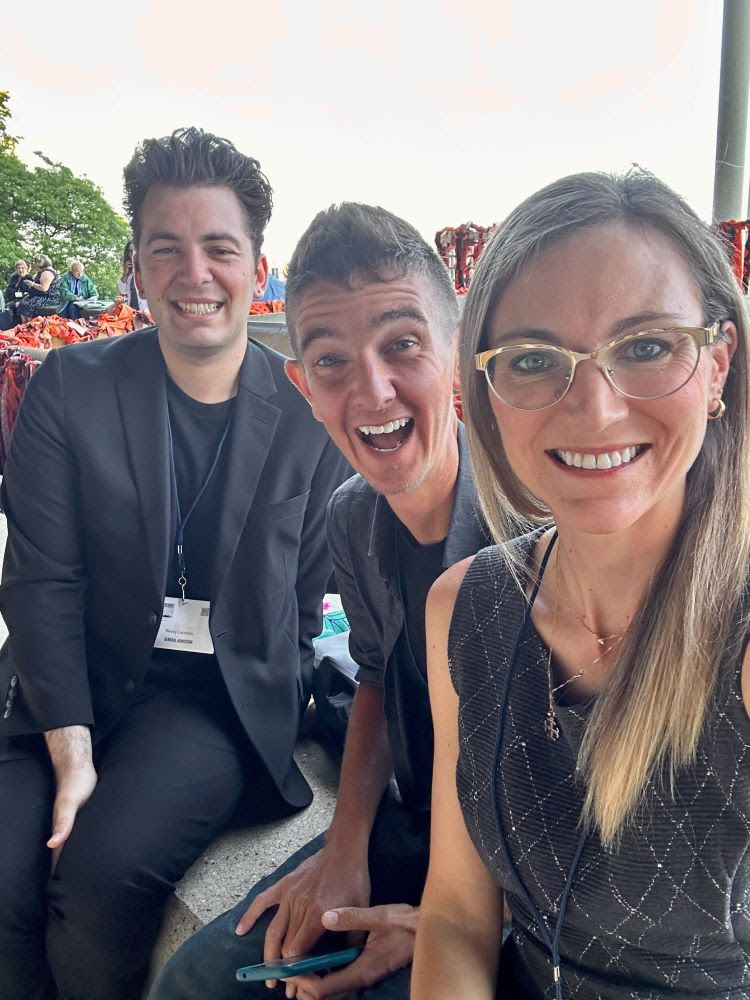A climate focus at the Parliament of the World's ReligionsYour weekly newsletter about faith and climate changeAugust 18, 2023  Members of Cristo Rey Parish prepare before the Parliament of the World's Religions Parade of Faiths on Sunday, Aug. 13, in Chicago. (AP/Paul Beaty) Since I started in my role as NCR environment editor during the pandemic years, I haven't had a lot of opportunities to connect with people in person. This week it has been especially wonderful to chat with folks face to face at the 2023 Parliament of the World's Religions being held in Chicago from Aug. 14–18 at McCormick Place. The theme for this year's gathering is "A Call to Conscience: Defending Freedom & Human Rights," and within that framework there is an intentional and significant focus on ecological concerns. It's been a bit of a struggle to decide which sessions to attend each day because every single one of them is important, and so many of them are relevant to the reporting we do here at EarthBeat. On Monday, I attended a session titled "Climate, Racism, and…Property?: The Call to Climate Justice for Religious Property Owners" that focused on the Nuns & Nones Land Justice Project. Global Sisters Report international editor Soli Salgado reported on the initiative last April, saying that through the Nuns & Nones Land Justice Project, sisters are learning how to create new land legacies that center racial and ecological healing. And in April this year, the director of the N&N Land Justice Project Brittany Koteles wrote an essay for EarthBeat about the role the Doctrine of Discovery still plays today and what Catholics should be doing about it. It has been one of the most-read pieces on EarthBeat so far this year. Then on Tuesday I met up with Luke Henkel, the North America Programs Coordinator with the Laudato Si' Movement. Henkel was at the gathering to screen the film "The Letter," which NCR environment correspondent Brian Roewe covered upon its release last fall. In his report, Roewe spoke with the documentary's director about how he brought Pope Francis' landmark encyclical "Laudato Si', On Care for Our Common Home" to life for the big screen. I also chatted with Wesley Cocozello, communications and programs manager for justice, peace and ecology for the Missionary Society of St. Columban, about what appears to be a growing focus on biodiversity and conservation, in addition to climate change, among faith communities in their conversations about creation care. Cocozello also plays a key role in organizing the Faiths for Biodiversity initiative, which Roewe reported on throughout his coverage of the United Nations conference on biodiversity, Other conference days were filled with sessions on the importance of interfaith dialogue and partnerships, faith organizations and houses of worship implementing climate solutions that work, shared commitments on how to move forward in good conscience, and lots of story ideas for you to look forward to at EarthBeat in the months to come. In an essay for EarthBeat this week addressed to the gathering of the Parliament of the World's Religions, Ugandan youth climate activist Vanessa Nakata said it might be "surprising" to some that people of faith would care so deeply about the planet, but the way she sees it, this work is the work of religious leaders because it centers on justice. Read more: For God's sake, justice: A message to the Parliament of the World's Religions  Flood victims from Mtauchira village carry food they received from the Malawi government in Blantyre March 16 in the aftermath of Cyclone Freddy, which destroyed their homes. (OSV News/Reuters/Esa Alexander) What else is new on EarthBeat:Cycle of food insecurity continues in Africa as aid heads to other world crises Why Catholics should divest from plastic in their closets As Maui rescue continues, families and faith leaders cling to hope, tackle reality On global warming, yes, there is hope One congregation offers case study as Episcopal Church works toward 2030 carbon neutral goal What's happening in other climate news:Judge Rules in Favor of Montana Youths in a Landmark Climate Case —David Gelles and Mike Baker for The New York Times Extreme water stress faced by countries home to quarter of world population —Sandra Laville for The Guardian Minnesota Tribal School Fights To Eliminate Forever Chemicals in Drinking Water —Zoya Teirstein for Grist NYC Buildings Complying With Emissions Law Faster Than Expected —Stephen Lee for Bloomberg Law Final Beat:
Thanks for reading EarthBeat!
Featured AdvertisersAdvertisement |
In this blog, we'll look at how men and women at serving Jesus Christ both at home and abroad. We'll focus on how God is using their work to transform the lives of people all over the world.
Friday, August 18, 2023
EarthBeat Weekly: A climate focus at the Parliament of the World's Religions
Subscribe to:
Post Comments (Atom)
Living into Right Relations: February 2026
February 25, 2026 View this email in your browser Reconciliation and Indigenous Justice News from The United Church of Canada The Creator’s ...

-
Genocide, Worker Rights, and White Christian Nationalism NCC Newsletter July 2, 2021 Click here to donate Recent Interview with Jim Winkl...
-
As we enter this sacred season — a time when many traditions gather to celebrate light in the darkness, rest after a long year, and the endu...
-
View this email in your browser Welcome to the Truth and Action Roundup, a reliable weekly source of information, inspiration, and action f...




 Stephanie Clary
Stephanie Clary

No comments:
Post a Comment